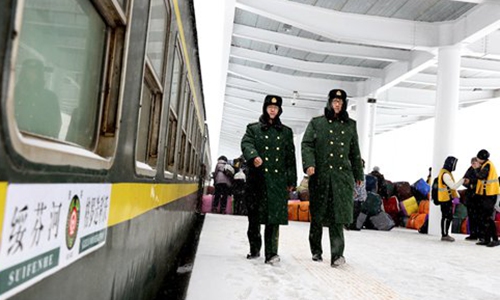Officials warn Chinese in Russia of high infection risk on return journey
By Wang Qi Source:Global Times Published: 2020/4/15 0:48:41

Members of the Armed Police patrol a train station in Suifenhe, in Northeast China's Heilongjiang Province. The city is a major transportation hub for China-Russia trade. Photo: CFP
Frontline experts coping with soaring cases of COVID-19 in Northeast China's Heilongjiang Province, which is facing increasing pressure of imported cases and a local epidemic, said the region will not become the next Wuhan as it has adequate medical supplies and pursues timely intervention, while warning local governments to remain alert to prevent more cross-infections.
Neither Suifenhe nor Harbin, cities in Heilongjiang that both suffer from escalating epidemic, will become the next Wuhan as there are no large-scale domestic cases in the two places and their impact on other regions is limited and under control, Yang Yanjie, deputy head of the expert group for epidemiological investigation of COVID-19 in Heilongjiang, told the Global Times Tuesday.
Yu Kaijiang, head of the expert group for medical treatment in Suifenhe, told the Global Times that the situation is stable and controllable, as the Suifenhe port remains closed.
Heilongjiang announced on Sunday the passenger channel of Suifenhe border port with Russia would remain closed.
"It is normal to have resurgence after a great epidemic as a virus cannot be eliminated completely within a short time," Yu noted.
The current medical care situation is adequate to cover the current increase in imported cases, Yu said.
"We are also preparing back-up designated hospitals, ensuring that more beds will be made available," Yu said, noting that the testing capability is meeting the demand and reaching 1,000 people per day.
The responses came after Heilongjiang reported on Monday that 79 new imported infections from Russia entered China through Suifenhe. It was the highest one-day rise in imported cases for the city with only 70,000 people.
Hao Jun, a researcher from the Heilongjiang authority, said Tuesday that according to their epidemiological investigation, most of the 366 imported cases from Suifenhe port were infected in the Lyublino Market and Sadavod Market in Moscow, where the patients worked.
Hao said as returnees from Russia share an enclosed space for a long time during their journeys and have close contact, the risk of infection rises. He suggested that overseas Chinese in Russia enhance self-protection and not enter China through Suifenhe to avoid the risk of being infected during the journey.
Suifenhe has 1,479 people under collective quarantine. Local officials said Monday that 15-20 percent of the people may test positive.
Two medical teams from Harbin Medical University with 205 members who just finished their mission in Wuhan to fight against the coronavirus, voluntarily requested deployment to support Suifenhe on Tuesday.
Heilongjiang, which is currently the hardest-hit province in the Chinese mainland with 336 existing infections, is recording the third-highest death toll in China after Hubei and Henan provinces.
Public concern about further calamities emerged after 11 new local cases and seven asymptomatic infections were found in the province's capital Harbin, and some people were reported to have been infected by imported cases.
Yu was worried that the asymptomatic cases may cause local cluster infections.
Harbin recorded 11 domestic infections from April 9 to Sunday, most were related to a man, who was infected by a US returnee and later concealed his health status, or by his close contacts after gathering.
Government of Harbin on Sunday said it will conduct 14-day closed-off management of apartments of asymptomatic people.
The whole nation is watching Heilongjiang. "Our goal is zero infections of medical workers and zero deaths of our patients," Yu told media.
Newspaper headline: Suifenhe ‘won’t become next Wuhan’
Posted in: SOCIETY,CHINA FOCUS